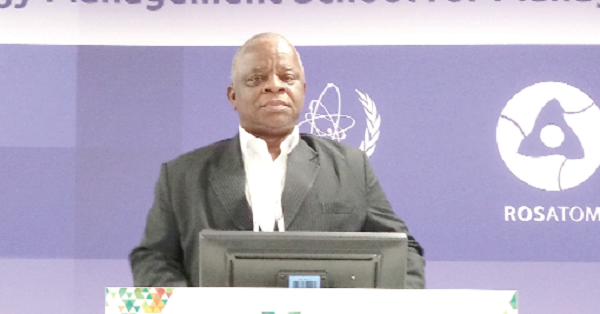
Regulatory authority endorses nuclear energy
The Ghana Nuclear Regulatory Authority (GNRA) is optimistic that the inclusion of nuclear power in the country's energy mix will bring to an end the perennial electrical power shortages that affect productivity in businesses and domestic consumers.
The authority is convinced that nuclear energy, which is suitable for base load, is the surest bet to sustainable electricity supply in the country.
Advertisement
As a result, the acting Director General of the GNRA, Prof. Kwame Aboh, said the authority would ensure that the country went through the globally accepted process to adopt the energy source for the benefit of all.
While admitting that there was an urgent need for the country to include nuclear in its energy mix, Prof. Aboh said the authority, as the regulator, would ensure that the process was carried out in a systematic and safe manner, in compliance with global standards on the establishment of nuclear power plants (NPPs).
“Ghana is making progress systematically because we do not want to short-circuit anything, so at every stage we invite the International Atomic Energy Agency (IAEA) to evaluate the progress and we move to the next one,” he said.
Media boot camp
Prof. Aboh gave the assurance yesterday when he addressed the media and other stakeholders in nuclear energy at a media boot camp in Accra.
Organised by the State Atomic Energy Corporation (ROSATOM) of Russia, the one-day event was to help expose the media to the rudiments of nuclear energy, help clear some misconceptions about the energy source and build capacity for an enhanced public engagement.
It consisted of presentations, practical and networking sessions between media practitioners and officials of ROSATOM Central and Southern Africa, the GRNA, the Ghana Atomic Energy Commission (GAEC) and the Nuclear and Alternative Energy Unit of the Ministry of Energy.
It was graced by the Director General of ROSATOM Central and Southern Africa, Mr Dmitry Shornikov, who took participants through global trends in nuclear energy and its benefits to the world economy.
Nuclear programme
Prof. Aboh said although the country had delayed in establishing a nuclear plant, there was hope that the trend would be reversed soon.
“The good news is that there is hope that we can solve our energy problem. We can solve it but we will need sustainable efforts,” he said.
It is expected that Ghana’s nuclear programme, which has suffered decades of back-and-forth movement, will materialise in 2029 when actual generation takes off.
Discussions around the implementation of the programme are aimed at ensuring that Ghana’s first plants add 2,400 megawatts to the national grid.
Crave for nuclear
Apart from South Africa, which currently has a commercial NPP, no African country has, with traditional energy sources such as hydro, thermal and renewable being the only sources.
Prof. Aboh said that was not good for the continent, given the importance of nuclear energy to industrialisation.
He noted that it was sad that while the world was craving for nuclear power plants, Africa was still sticking to traditional power sources, which were now dwindling.
“The question that I will ask is: if you see your friends running for life, do you remain static? We also need to join the race if we are supposed to be energy sufficient to be able to grow this economy,” he said.
He later told the Daily Graphic that the authority was well positioned to use regulations and international best practices to govern the country’s nuclear programme.
Possibility of export
With electricity grids in West African being interconnected through the West Africa Grid, Prof. Aboh said an actualisation of Ghana’s nuclear programme would be opportune, given that the country could easily export excess power to neighbouring countries.
He implored the media to report fairly on nuclear energy, explaining that the various misconceptions about the energy source were contributing to the strong resentment to it.
Expertise
Mr Shornikov said nuclear remained the friendliest energy source available to the world and further pledged his company’s commitment to support Ghana to realise its nuclear energy ambitions.
He said ROSATOM and Russia in general had gathered enormous experience in the nuclear business, right from the mining of uranium – the fuel for nuclear reactors – to the construction of reactors and the management of waste.
That, he said, would be made available to Ghana as and when the need arose.




